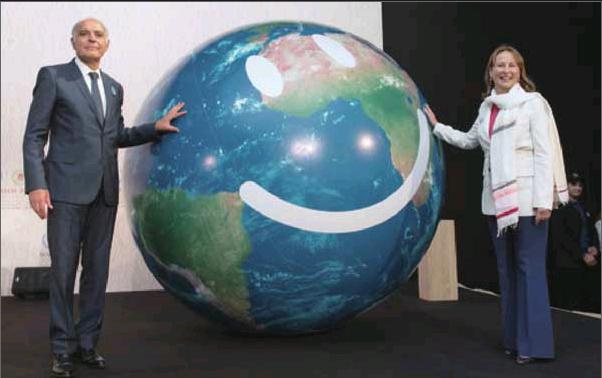Time to Turn Words Into Action
2016-12-21

Beijing Review: Chinas top climate change official, Xie Zhenhua, has referred to the Marrakech climate change conference as an opportunity to implement the Paris agreement and the pledges made by its signatories. Whats your take on this? Zou Ji: I think implementation here has multiple meanings. First of all, countries should carry out the arrangements and the six factors—mitigation, adaptation, capital, technology, transparency and capacity building—included in the Paris agreement. All contracting countries should respect and stick to the basic principles of the United Nations Framework Convention on Climate Change (UNFCCC)—the principle of common but differentiated responsibilities, the equality principle and the respective capabilities principle. These form the cornerstone of the Paris agreement, and all countries deem them [to constitute] a political consensus. These principles infiltrate every aspect of the Paris agreement, including the six factors. To fully carry out the principles, a lot of details should be decided, which is a major task of the Marrakech conference and undoubtedly an arduous process.
Second, before the commitment period of the Paris agreement begins in 2020, countries should continue to carry out pledges made in the second commitment period of the Kyoto Protocol and other arrangements under the UNFCCC, such as the Bali Roadmap, by 2020. Efforts in fighting climate change should be unremitting. More specifically, the focus is how developed countries party to the Kyoto Protocol will realize their promises. As we have seen, the European Union (EU), a major contracting party, has put its promises made for the period before 2020 into reality. Thats to say, the EU has lowered its greenhouse gas emissions by 20 percent from 1990 levels, and it has the strength to exceed its promise. However, its reluctant to boost its emission reduction ambition and raise its target.
I once suggested to EU negotiators that they issue a declaration to boost their ambition, but they didnt accept it. In my view, developed countries should play a leading role in the war against climate change and enhance mutual trust between countries. They should leave no stone unturned to reduce emissions, rather than standing by after achieving their set goals.
Im not condemning the EU because it has fulfilled its promises before 2020 and set a good example for other developed countries. I mean, if it can show the willingness to exhaust its emission reduction capability, developing countries such as China and India would be better stimulated to fulfill their promises and stronger momentum would be generated. This applies to the United States as well.
Developed countries should respect the promise they made in Copenhagen that$100 billion will be provided annually from 2020 [to enable] developing countries to build their emission reduction capabilities and cope with climate change. According to calculations by some experts from the Organization for Economic Cooperation and Development (OECD), more than $60 billion has been raised to date. But, what we need to know is the method of accounting and where the money will go.
For instance, if developed countries label existing poverty alleviation funds as financial support to developing countries in dealing with climate change, the negotiations during previous climate change conferences will make no sense. Developed countries should acknowledge the figure and avoid double counting or masquerading. Making related details clear will improve transparency and strengthen mutual political trust. In addition, a concrete roadmap and timetable regarding the funding should be put in place.
In other words, developed countries should let developing countries know how the funds are collected and what they plan to do in the coming two or three years. Since the “concrete roadmap” has been written into the Paris agreement, negotiators will work out approaches to implement it. In short, issues related to funding—including the accounting method, roadmap and where the money comes from and goes to—should be made clear, and this is the focus of the negotiations during the Marrakech conference.
Xie has made it clear on more than one occasion that China will not vie with other developing countries and small island countries for the $100 billion in the Green Climate Fund. But thats not to say that China doesnt have the right to use this money.
How will the global stock take mechanism be started?
A key mechanism of the Paris agreement—the global stock take—is another focus of discussions at this conference. While countries submitted their intended nationally determined contributions (INDCs) to the UNFCCC, the global stock take was created at the Paris conference. As some global climate change experts estimate, all of the INDCs currently submitted by countries would result in an average global temperature increase of around 2.7 degrees Celsius by 2100, falling short of the 2-degreeCelsius goal. To bridge the gap, countries have agreed to assess their implementation strategies and take stock of their efforts results every five years. The assessments will start from 2023, and after that, countries will have to reinforce their actions every five years. A facilitating dialogue will be launched in 2017, and at the Marrakech conference, representatives are exchanging views on this front on informal occasions.
Negotiations are fraught with arguments, conflicts and contradictions. We should know how to seek common ground and move forward.
The United States has refused to sign the Kyoto Protocol, and Canada has withdrawn from, and Japan is reluctant to join, the second commitment period. Will these developed countries change their attitudes at this conference?
Countries party to the Kyoto Protocol have to realize their promises made under the framework of the protocol, while countries that didnt sign it, such as the United States, have to do what they have promised under the Bali Roadmap. Refusing to join the Kyoto Protocol doesnt mean these countries dont have to cut emissions. As contracting coun- tries of the UNFCCC, they have to perform their duties and carry out their promises made in the Cancun Accord under the Bali Roadmap.
According to Chinas Policies and Actions on Climate Change (2016), China has accomplished the set goals in terms of energy consumption intensity, carbon intensity and forest stock ahead of time. Do you think China will also achieve its INDCs in advance?
The report primarily relates the achievements China made last year and during the 12th Five-Year Plan period (2011-15). INDCs are what a country will accomplish during the period from 2020 to 2030. The two are closely interrelated, because current performance will determine whether long-term goals can be smoothly achieved.
How could China meet energy conservation and emission reduction targets in recent years? For one thing, the Chinese Government and people have devoted much attention and resources to improve the efficiency of energy consumption and cut coal use. For another, theres no denying that Chinas economy has entered a new normal in recent years, and declining economic growth in combination with overcapacity [reduction] has greatly alleviated the pressure on emission reduction.
If we can manage to complete the goals set for the 13th Five-Year Plan period (2016-20), China will see its carbon dioxide intensity decrease at least 49 percent from its 2005 level. This means China will outperform its promise of 45-percent decrease in the Cancun Accord and step closer toward its goal of 60-65 percent decrease before 2030.
However, we should also take note of the future trajectory of energy consumption in some sectors. For now, the manufacturing and industrial sectors are major energy consumers, while in the future, construction and transportation may catch up and their energy consumption will rise. Therefore, we should pay close attention to these sectors as well.
